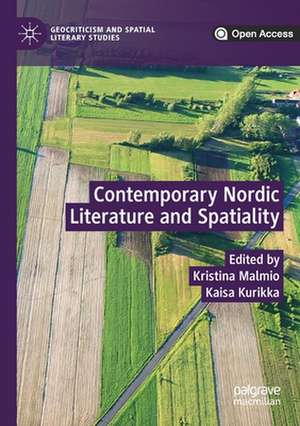Contemporary Nordic Literature and Spatiality: Geocriticism and Spatial Literary Studies
Editat de Kristina Malmio, Kaisa Kurikkaen Limba Engleză Paperback – 11 sep 2020
| Toate formatele și edițiile | Preț | Express |
|---|---|---|
| Paperback (1) | 215.71 lei 43-57 zile | |
| Springer International Publishing – 11 sep 2020 | 215.71 lei 43-57 zile | |
| Hardback (1) | 228.78 lei 43-57 zile | |
| Springer International Publishing – 11 sep 2019 | 228.78 lei 43-57 zile |
Din seria Geocriticism and Spatial Literary Studies
- 20%
 Preț: 628.29 lei
Preț: 628.29 lei - 9%
 Preț: 764.93 lei
Preț: 764.93 lei - 18%
 Preț: 783.05 lei
Preț: 783.05 lei - 15%
 Preț: 696.50 lei
Preț: 696.50 lei - 18%
 Preț: 787.29 lei
Preț: 787.29 lei -
 Preț: 489.48 lei
Preț: 489.48 lei - 9%
 Preț: 635.06 lei
Preț: 635.06 lei - 15%
 Preț: 465.66 lei
Preț: 465.66 lei -
 Preț: 390.84 lei
Preț: 390.84 lei - 15%
 Preț: 470.06 lei
Preț: 470.06 lei - 15%
 Preț: 471.03 lei
Preț: 471.03 lei - 15%
 Preț: 701.90 lei
Preț: 701.90 lei - 18%
 Preț: 736.16 lei
Preț: 736.16 lei - 15%
 Preț: 581.98 lei
Preț: 581.98 lei -
 Preț: 382.36 lei
Preț: 382.36 lei -
 Preț: 479.47 lei
Preț: 479.47 lei -
 Preț: 390.84 lei
Preț: 390.84 lei - 15%
 Preț: 694.83 lei
Preț: 694.83 lei -
 Preț: 387.75 lei
Preț: 387.75 lei -
 Preț: 386.81 lei
Preț: 386.81 lei - 15%
 Preț: 642.51 lei
Preț: 642.51 lei - 15%
 Preț: 642.03 lei
Preț: 642.03 lei - 15%
 Preț: 692.41 lei
Preț: 692.41 lei - 15%
 Preț: 495.33 lei
Preț: 495.33 lei -
 Preț: 388.72 lei
Preț: 388.72 lei -
 Preț: 385.62 lei
Preț: 385.62 lei - 15%
 Preț: 694.87 lei
Preț: 694.87 lei - 15%
 Preț: 529.60 lei
Preț: 529.60 lei -
 Preț: 389.70 lei
Preț: 389.70 lei -
 Preț: 453.60 lei
Preț: 453.60 lei -
 Preț: 386.81 lei
Preț: 386.81 lei - 15%
 Preț: 700.29 lei
Preț: 700.29 lei
Preț: 215.71 lei
Nou
Puncte Express: 324
Preț estimativ în valută:
41.28€ • 43.20$ • 34.35£
41.28€ • 43.20$ • 34.35£
Carte tipărită la comandă
Livrare economică 31 martie-14 aprilie
Preluare comenzi: 021 569.72.76
Specificații
ISBN-13: 9783030233556
ISBN-10: 3030233553
Pagini: 307
Ilustrații: XVII, 307 p. 7 illus.
Dimensiuni: 148 x 210 x 18 mm
Greutate: 0.39 kg
Ediția:1st ed. 2020
Editura: Springer International Publishing
Colecția Palgrave Macmillan
Seria Geocriticism and Spatial Literary Studies
Locul publicării:Cham, Switzerland
ISBN-10: 3030233553
Pagini: 307
Ilustrații: XVII, 307 p. 7 illus.
Dimensiuni: 148 x 210 x 18 mm
Greutate: 0.39 kg
Ediția:1st ed. 2020
Editura: Springer International Publishing
Colecția Palgrave Macmillan
Seria Geocriticism and Spatial Literary Studies
Locul publicării:Cham, Switzerland
Cuprins
1. Introduction: Storied Spaces of Contemporary Nordic Literature.- Part I Whose Place Is This Anyway? On the Social Uses of Space and Power.- 2. On the Commons: A Geocritical Reading of Amager Fælled.- 3. Mapping a Postmodern Dystopia: Hassan Loo Sattarvandi’s Construction of a Swedish Suburb.- 4. Living Side by Side in an Individualized Society: Home, Place, and Social Relations in Late Modern Swedish-Language Picturebooks.- Part II Where Do You Feel? Spaces, Emotions, and Technology.- 5. Love, Longing, and the Smartphone: Lena Andersson, Vigdis Hjorth and Hanne Ørstavik.- 6. “Never Give Up Hopelessness!?”: Emotions and Spatiality in Contemporary Finnish Experimental Poetry.- Part III Which Language Do You Use? Spaces of Language and Text.- 7. Stavanger, Pre- and Postmodern: Øyvind Rimbereid’s Poetry and the Tradition of Topographic Verse.- 8. The Poetics of Blank Spaces and Intervals in Selected Works of Elisabeth Rynell.- 9. What Have They Done to My Song? Recycled Language in Monika Fagerholm’s The American Girl.- Part IV Is This a Possible Space? Potentialities of Space.- 10. “A Geo-Ontological Thump”: Ontological Instability and the Folding City in Mikko Rimminen’s Early Prose.- 11. Uncanny Spaces of Transformation: Fabulations of the Forest in Finland-Swedish Prose.- 12. “The World in a Small Rectangle”: Spatialities in Monika Fagerholm’s Novels.- 13. The Miracle of the Mesh: Global Imaginary and Ecological Thinking in Ralf Andtbacka’s Wunderkammer.
Notă biografică
Kristina Malmio is University Lecturer, Adjunct Professor in Nordic Literature at the University of Helsinki, Finland, and leader of the research project “Late Modern Spatiality in Finland-Swedish Prose Literature.”
Kaisa Kurikka is Researcher and Adjunct Professor in the School of History, Culture, and Arts Studies at the University of Turku, Finland. She has a doctorate in Finnish Literature.
Kaisa Kurikka is Researcher and Adjunct Professor in the School of History, Culture, and Arts Studies at the University of Turku, Finland. She has a doctorate in Finnish Literature.
Textul de pe ultima copertă
This open access collection offers a detailed mapping of recent Nordic literature and its different genres (fiction, poetry, and children’s literature) through the perspective of spatiality. Concentrating on contemporary Nordic literature, the book presents a distinctive view on the spatial turn and widens the understanding of Nordic literature outside of canonized authors. Examining literatures by Danish, Norwegian, Swedish, and Finnish authors, the chapters investigate a recurrent theme of social criticism and analyze this criticism against the welfare state and power hierarchies in spatial terms. The chapters explore various narrative worlds and spaces—from the urban to parks and forests, from textual spaces to spatial thematics, studying these spatial features in relation to the problems of late modernity.
Caracteristici
Examines Nordic poetry, fiction, and children’s literature Considers the social, political, and technological uses of space in literature Incorporates literary urban studies, ecocriticism, and affect theory
